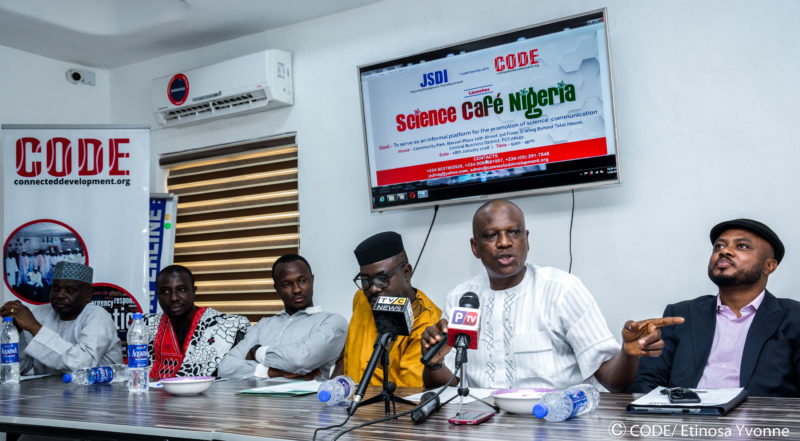The National Biosafety Management Agency (NBMA) has disclosed plans to partner with Journalists for Social Development Initiative (JSDI) and Connected Development (CODE) through their Science Café initiative to train journalists on safe science reporting.

Professor Danladi Atu; Coordinator, Journalists for Social Development Initiative (JSDI), Etta Michael Bisong; Head of Governance, Connected Development (CODE), Emmanuel Njoku; Director-General/CEO, National Biosafety Management Agency (NBMA), Dr. Rufus Ebegba; Publisher, Forefront Media, Mr. Amos Dunia; and Representative, Nigerian Biosafety Association, Mr. Livinus Ibiang, during the opening ceremony of the inaugural Science Cafe in Nigeria, in Abuja on Thursday, January 18, 2018
Director General of the Agency, Dr. Rufus Ebegba, who made the disclosure during the opening ceremony of a Science Café on Thursday January 18, 2018 in Abuja, described safe science as a vital ingredient and foundation for national development.
And if this ingredient is not properly mixed to lay the required foundation, according to him, the nation may not reap the desired benefit of modern technologies and harness their potentials for sustainable living.
“Communicating safe science appropriately will make Nigerians understand and appreciate the role science can play in their daily lives,” Dr. Ebegba said. “It will also inspire our youth to boldly enter various fields of scientific study.”
However, the NBMA helmsman lamented that the lack of proper awareness on how new technologies can improve human activities has negatively influenced consumer choice and acceptance of certain innovations.
The Director General, who cited the case of modern biotechnology and its products in his lecture paper at the event titled: “Science, Technology & Modern Society: Role of Communication in achieving sustainable livelihood”, expressed displeasure over how some activists have taken to misinforming as well as misrepresenting issues, and inciting the people against government agencies like the NBMA.
He explained that these misconceptions have created a serious burden by generating fear and mistrust especially influencing how quickly a technology is adopted to solve local problems and facilitate national growth.
He reinforced the controversy surrounding agricultural biotechnology, genetically modified organisms (GMOs) and biosafety in particular to underscore how scientific findings, public opinions and attitudes can make the public either accept or resist new technological innovations.
“Issues like these are precisely why good scientific communication is important,” he said.
The biosafety advocate referred to the media as a powerful tool which Nigeria must leverage on to move from being a net consumer of the products of scientific innovations to being a pioneer in various scientific and technological fields.
He submitted that good science journalism should help to build the consciousness of the people and educate them on the truth about certain controversial scientific and technological innovations.
During his remarks at the occasion, Director General, APUDI Institute of Peace Studies and Social Rehabilitation (APIS), Professor Danladi Atu, talked about the need to adopt a formal and an informal approach in the search for solutions to decipher the challenges facing science & technology in society.
Prof. Atu said the combination of these approaches is important to help solve the problem that the conventional way of learning science has created.
His words: “Part of the problem here is that we are so involved in conventional curriculum programmes to the point that informal approaches are neglected.”
He noted that the establishment of the Science Café is a clear departure from the conventional to a total new way of teaching science because, research has shown that there is a connection between past and present experiences.
The APIS boss urged Nigerians to accept science & technology and find a way to mitigate its impacts for progressive livelihood.
Other participants at the event canvassed the need for more scientific research, simplification of terminologies, as well as continuous engagement with stakeholders especially the private sector to help implement government blueprint on science & technology across the country.
By Etta Michael Bisong, Abuja
